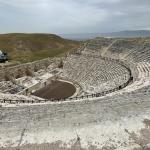
Welcome to the Ephesiology blog! A blog focused on the intersection of theology and culture.
There are those who might wonder if there is such an intersection between theology and culture. After all, some will insist that theology is opposed to culture. At times, it certainly seems that theology has nothing to say to contemporary issues. At least nothing constructive. It feels old, antiquated, and out of touch. Theology is, basically, irrelevant. It has gone the way of the past.
Others might insist like the father of Latin theology, Tertullian, “What indeed has Athens to do with Jerusalem, the Academy with Christ?” Rather than constructively addressing culture, theology becomes an instrument–at times a hammer–to confront culture. It polarizes and divides rather than restores and unites. They substitute the fundamental axiom that “all truth is God’s truth” for a deceptive new axiom that “my tribe’s truth is God’s truth.”
Still, there are those of us who might side with the great early Christian philosophers like Justin and Origen who saw that anything that was good in culture could contribute to their theological discourse. We might even cautiously agree with Adolf von Harnack:
“Dogmas arise, develop themselves and are made serviceable to new aims; this in all cases takes place through Theology. But Theology is dependent on innumerable factors, above all on the spirit of the time; for it lies in the nature of theology that it desires to make its object intelligible. Dogmas are the product of theology, not inversely; of a theology of course which, as a rule, was in correspondence with the faith of the time.” (History of Dogma, 1951:21)
The Good and Bad of Culture
There are good things happening in cultures all around the world; things that occasionally restore hope in human nature. We might not always hear about them. News cycles often focus on issues which will generate more viewers or clicks; the sensational, political, those issues that will undoubtedly animate and excite the base. They are issues, nevertheless, where theology can contribute: war, race, gender, mental health, environmental issues, disease, poverty, riots, even gun violence. Theology can very well pave a way for us to think and put into action meaningful solutions in society.
Not all issues are so complex, but they are still important. Theology can speak to them as well. It can help the dad who is concerned about the success of their children; the mom who desperately desires a relationship with her daughter; the child who is seeking the attention of a parent. In essence, engaging in theological discourse around such important topics help us see that God continues to be present even when we might not feel like He is.
But what about the things going unreported that often restore our hope? The heroes bringing clean water, sanitation, and education to the Kibera slums of Kenya; healthcare workers in Uganda educating people about the risk of AIDS; local farmers in India utilizing new technology to combat hunger in their communities; trauma counselors helping children cope with the death of a parent; social workers listening and teaching skills to Autistic children; nurses holding the hand of their dying patient. These heroes and the challenges they face are not always newsworthy. Yet, theology can speak into all of them in ways that help us see that God has not forgotten us.
Our Approach to Theology
However, our approach to theology often clouds or masks its benefits. When talking about theology, we frequently draw lines in the sand, even erect barriers to any real conversation, and become ideologues rather than human beings who, if willing, can demonstrate grace and compassion. It is here where theology will not, indeed cannot, make a contribution. Instead, it alienates and marginalizes. It becomes polemical and judgmental.
Those of us who value theology and its contribution to meaningful cultural dialogue do well to listen to the words of Augustine.
“In matters that are obscure and far beyond our vision, even in such as we may find treated in Holy Scripture, different interpretations are sometimes possible without prejudice to the faith we have received. In such a case, we should not rush in headlong and so firmly take our stand on one side that, if further progress in search of truth justly undermines this position, we too fall with it.” (The Literal Meaning of Genesis, 1.18)
So, once again, welcome to the Ephesiology blog! A blog focused on the intersection of theology and culture.












